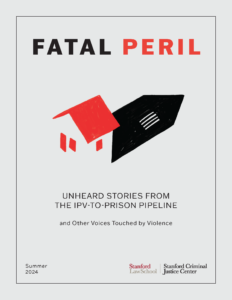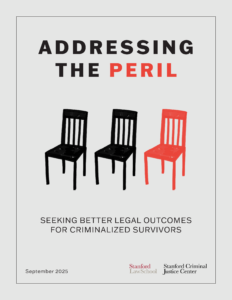The Regilla Project*
National Census of Women Who Are Incarcerated for Offenses Stemming from Intimate Partner Violence

The Stanford Criminal Justice Center is leading a national research project to understand how people experiencing gender-based violence are criminalized for actions they took to survive abuse. While IPV exists for people of all genders, we are focused on women given their disproportionate rates of severe and lethal intimate partner abuse. We also are centering our research on people convicted of the most serious of offenses and serving the longest sentences––murder and manslaughter.
Our goal is to help guide policy discussions on charging, sentencing, prison programming, parole and reentry policies and decisions. The results may also inform laws regarding self-defense and other affirmative defenses, and strategies for addressing intimate partner violence.
In June 2023, the team released a new report, called Great Weight: A Review of California Board of Parole Hearing Transcripts to Assess Frequency and Consideration of Intimate Partner Violence among Women Convicted of Homicide Offenses. The report estimated how many women in California state prisons are incarcerated for homicide offenses that were directly linked to their experiences of intimate partner violence by reviewing California Board of Parole Hearings transcripts. The analysis also examined how these women fare during the parole process. The report includes results along with specific recommendations, and is available here.

In Summer 2024, the team released a new report, entitled Fatal Peril: Unheard Stories from the IPV-to-Prison Pipeline and Other Voices Touched by Violence, examining the prevalence of intimate partner violence among 649 people incarcerated for murder or manslaughter in California’s women’s prisons. The study represents the first time the Composite Abuse Scale and Danger Assessment, two validated instruments used to assess intimate partner violence and intimate partner homicide, have been used on a prison population. In addition to quantitative results, the report presents qualitative data collected from 537 study respondents in which they share their experiences of abuse, the circumstances of the offenses, their experiences of the criminal legal system, and their feelings of regret, remorse and healing. The report is available here.

In light of the findings from Fatal Peril, we hosted a statewide Roundtable in November 2024 to generate understanding and recommendations for six segments of California’s criminal legal system for cases involving survivors accused of IPV-related homicide: policing, prosecution, judging, defense practice, parole and corrections, and post-conviction relief and homicide liability. The Roundtable brought together diverse stakeholders from across the State, including formerly incarcerated survivors, advocates, experts on gender violence, law enforcement professionals, prosecutors, public and private defense attorneys, judges, parole and corrections leadership, and representatives from the State’s legislative and executive branches. Addressing the Peril: Seeking Better Legal Outcomes for Criminalized Survivors provides background legal and policy information, summarizes discussions that took place at the Roundtable, and offers concrete strategies and recommendations in each of the six areas: policing, prosecution, defense, judging, corrections and parole, and homicide liability and post-conviction remedies. The report is available here.
*Regilla is the first known victim of intimate partner homicide. A Roman woman who was married at the age of 15 to Herodes, she was kicked down the stairs when she was eight months pregnant with her sixth child. The circumstances of her death were mysterious but have been pinned to her husband’s servicemen. Regilla’s brother charged Herodes with murder, but a Roman court (at the urging of Marcus Aurelius) acquitted him.
